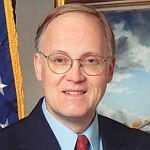 (Host) Many voters don’t feel satisfied with the campaign now underway,
(Host) Many voters don’t feel satisfied with the campaign now underway,
especially at the national level. That includes former Vermont governor and commentator Jim Douglas, who was involved
in the process for many years.
(Douglas) For many years, I used
to be campaigning myself in the fall , shaking hands, kissing babies,
raising money and running ads, all to persuade voters to give me the
opportunity to serve. But this year, I can’t wait for the political
season to be over and I envy our Canadian neighbors, who recently ended a
campaign that lasted a mere 33 days.
We’re enduring a barrage
of radio, television and internet ads that are trying to influence our
votes. Most don’t offer policy initiatives or visions of the contenders
who sponsor them: the majority tell us why the other candidate is no
good. Even the positive ads lack any real substance, for fear of
offending a key constituency or furnishing fodder to the opposition.
It’s difficult to figure out what they’re actually saying; for example,
each presidential candidate accuses the other of proposing to end medicare as we know it. And the so-called ‘super PACs’ are making large
independent expenditures, adding to the cacophony.
Sadly, even
the media aren’t much help. A recent Gallup survey concludes that 60% of
Americans "have little or no trust in the mass media to report the news
fully, accurately, and fairly." This is an all-time high and the
reverse of public sentiment a generation ago. Let’s face it: many
networks and programs don’t really present the news: they offer their
own spin, reinforcing the opinions of their viewers and listeners and
further polarizing the electorate. Even local editorials and letters to
the editor are edgier these days. The media often focus on matters that
distract us from what’s really important: more Americans have likely
heard of the controversies surrounding Barack Obama’s birthplace and
Mitt Romney’s ‘47%’ remarks than of the candidates’ positions on foreign
policy or the Federal debt.
But a new organization is trying to
cut through all this. ‘Face the Facts USA’ is a project of The George
Washington University. It’s trying to elevate the discourse by offering
100 facts during the final 100 days before the November election. It’s
led by Frank Sesno, a Middlebury grad and former network reporter. As a
disclosure, I’m on its advisory board. ‘Face the Facts’ presents
information objectively on various policy issues and invites you to make
up your own mind on what direction is best.
I suppose it’s
naive to hope that we might return to a less contentious time. Lincoln
and Douglas spoke for 3 uninterrupted hours during their debates in
1858; so it was hard to avoid substance. Some presidential candidates a
century or more ago conducted ‘front porch campaigns.’ They literally
stayed home and delivered speeches to those who assembled in their
yards. Most of them won! But we have a right, indeed a responsibility,
to hold candidates to a higher standard: whether for the presidency or a
local office, we should insist that they tell us what they really
believe and how they would lead. If they have the courage of their
convictions, they have nothing to fear.